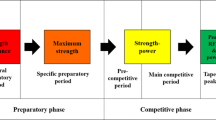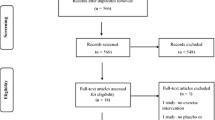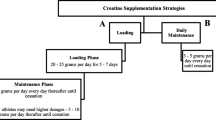Abstract
The present study aimed to investigate the impact on metabolism of altering the timing and volume of ingested carbohydrate during soccer-specific exercise. Twelve soccer players performed a soccer-specific protocol on three occasions. On two, 7 ml kg−1 carbohydrate–electrolyte or placebo were ingested at 0 and 45 min. On a third, the same total volume of carbohydrate–electrolyte was consumed but at 0, 15, 30, 45, 60 and 75 min. Carbohydrate–electrolyte ingestion increased blood glucose, insulin and carbohydrate oxidation, whilst suppressing NEFA, glycerol and fat oxidation (P < 0.05) although manipulating the schedule of carbohydrate ingestion elicited similar metabolic responses (P > 0.05). However, consuming fluid in small volumes reduced the sensation of gut fullness (P < 0.05). The results demonstrated that when the total volume of carbohydrate consumed is equal, manipulating the timing and volume of ingestion elicits similar metabolic responses. Furthermore, consuming a small volume of fluid at regular intervals reduces the sensation of gut fullness.







Similar content being viewed by others
References
Bangsbo J (1994) The physiology of soccer, with special reference to intense intermittent exercise. Acta Physiol Scand (Suppl.) 151:1–155
Borg G (1970) Perceived exertion as an indicator of somatic stress. Scand J Rehabil Med 2:92–98
Burgess WA, Davis JM, Bartoli WP, Woods JA (1991) Failure of low dose carbohydrate feeding to attenuate glucoregulatory hormone responses and improve endurance performance. Int J Sport Nutr 1:338–352
Clarke ND, Drust B, MacLaren DPM, Reilly T (2005) Strategies for hydration and energy provision during soccer-specific exercise. Int J Sport Nutr Exerc Metab 15:625–640
Convertino VA, Armstrong LE, Coyle EF, Mack GW, Sawka MN, Senay LC, Sherman WM (1996) American college of sports medicine position stand—exercise and fluid replacement. Med Sci Sports Exerc 28:R1–R7
Costill DL, Saltin B (1974) Factors limiting gastric emptying during rest and exercise. J Appl Physiol 37:679–683
Coyle EF, Hagberg JM, Hurley BF, Martin WH, Ehsani AA, Holloszy JO (1983) Carbohydrate feeding during prolonged strenuous exercise can delay fatigue. J Appl Physiol 55:230–235
Coyle EF, Coggan AR, Hemmert MK, Ivy JL (1986) Muscle glycogen utilization during prolonged strenuous exercise when fed carbohydrate. J Appl Physiol 61:165–172
Coyle EF, Hamilton MT, Alonso JG, Montain SJ, Ivy JL (1991) Carbohydrate metabolism during intense exercise when hyperglycemic. J Appl Physiol 70:834–840
Drust B, Reilly T, Cable NT (2000) Physiological responses to laboratory-based soccer-specific intermittent and continuous exercise. J Sports Sci 18:885–892
Duchman SM, Ryan AJ, Schedl HP, Summers RW, Bleier TL, Gisolfi CV (1997) Upper limit for intestinal absorption of a dilute glucose solution in men at rest. Med Sci Sports Exerc 29:482–488
Ekblom B (1986) Applied physiology of soccer. Sports Med 3:50–60
Felig P, Cherif A, Minagawa A, Wahren J (1982) Hypoglycemia during prolonged exercise in normal men. N Eng J Med 306:895–900
Ferguson MA, Mccoy S, Mosher PE (2005) Exercise in a hot environment: comparison of two different fluid intake patterns. J Sports Med Phys Fitness 45:501–506
Fielding RA, Costill DL, Fink WJ, King DS, Hargreaves M, Kovaleski JE (1985) Effect of carbohydrate feeding frequencies and dosage on muscle glycogen use during exercise. Med Sci Sports Exerc 17:472–476
Frayn KN (1983) Calculation of substrate oxidation rates in vivo from gaseous exchange. J Appl Physiol 55:628–634
Fritzsche RG, Switzer TW, Hodgkinson BJ, Lee SH, Martin JC, Coyle EF (2000) Water and carbohydrate ingestion during prolonged exercise increase maximal neuromuscular power. J Appl Physiol 88:730–737
Jacobs I, Westlin N, Karlsson J, Rasmusson M, Houghton B (1982) Muscle glycogen and diet in elite soccer players. Eur J Appl Physiol 48:297–302
Kirkendall DT (1993) Effects of nutrition on performance in soccer. Med Sci Sports Exerc 25:1370–1374
Leatt PB, Jacobs I (1989) Effect of glucose polymer ingestion on glycogen depletion during a soccer match. Can J Sport Sci 14:112–116
Leiper JB, Prentice AS, Wrightson C, Maughan RJ (2001) Gastric emptying of a carbohydrate-electrolyte drink during a soccer match. Med Sci Sports Exerc 33:1932–1938
Leiper JB, Nicholas CW, Ali A, Williams C, Maughan RJ (2005) The effect of intermittent high-intensity running on gastric emptying of fluids in man. Med Sci Sports Exerc 37:240–247
Mitchell JW, Nadel ER, Stolwijk JA (1972) Respiratory weight losses during exercise. J Appl Physiol 32:474–476
Melin B, Cure M, Jimenez C, Koulmann N, Savourey G, Bittel J (1994) Effect of ingestion pattern on rehydration and exercise performance subsequent to passive dehydration. Eur J Appl Physiol 68:281–284
Mitchell JB, Costill DL, Houmard JA, Fink WJ, Pascoe DD, Pearson DR (1989) Influence of carbohydrate dosage on exercise performance and glycogen metabolism. J Appl Physiol 67:1843–1849
Nicholas CW, Williams C, Boobis LH, Little N (1994) Effect of ingesting a carbohydrate-electrolyte beverage on muscle glycogen utilisation during high intensity, intermittent shuttle running. Clin Sci 87 (Suppl.):26
Nicholas CW, Williams C, Lakomy HK, Phillips G, Nowitz A (1995) Influence of ingesting a carbohydrate–electrolyte solution on endurance capacity during intermittent, high-intensity shuttle running. J Sports Sci 13:283–290
Nicholas CW, Tsintzas K, Boobis L, Williams C (1999) Carbohydrate–electrolyte ingestion during intermittent high-intensity running. Med Sci Sports Exerc 31:1280–1286
Ostojic SM, Mazic S (2002) Effects of a carbohydrate–electrolyte drink on specific soccer tests and performance. J Sports Sci Med 1:45–53
Reilly T (1997) Energetics of high-intensity exercise (soccer) with particular reference to fatigue. J Sports Sci 15:257–263
Reilly T, Ekblom B (2005) The use of recovery methods post-exercise. J Sports Sci 23:619–627
Reilly T, Thomas V (1976) A motion analysis of work-rate in different positional roles in professional football match play. J Hum Mov Stud 7:87–97
Saltin B (1973) Metabolic fundamentals in exercise. Med Sci Sports Exerc 5:137–146
Shi XC, Gisolfi CV (1998) Fluid and carbohydrate replacement during intermittent exercise. Sports Med 25:157–172
Tsintzas OK, Williams C, Boobis L, Greenhaff P (1995) Carbohydrate ingestion and glycogen utilization in different muscle fibre types in man. J Physiol 489:243–250
Wright DA, Sherman WM, Dernbach AR (1991) Carbohydrate feedings before, during, or in combination improve cycling endurance performance. J Appl Physiol 71:1082–1088
Zeederberg C, Leach L, Lambert EV, Noakes TD, Dennis SC, Hawley JA (1996) The effect of carbohydrate ingestion on the motor skill proficiency of soccer players. Int J Sport Nutr 6:348–355
Acknowledgments
This study was supported by GlaxoSmithKline.
Author information
Authors and Affiliations
Corresponding author
Rights and permissions
About this article
Cite this article
Clarke, N.D., Drust, B., Maclaren, D.P.M. et al. Fluid provision and metabolic responses to soccer-specific exercise. Eur J Appl Physiol 104, 1069–1077 (2008). https://doi.org/10.1007/s00421-008-0864-x
Accepted:
Published:
Issue Date:
DOI: https://doi.org/10.1007/s00421-008-0864-x




